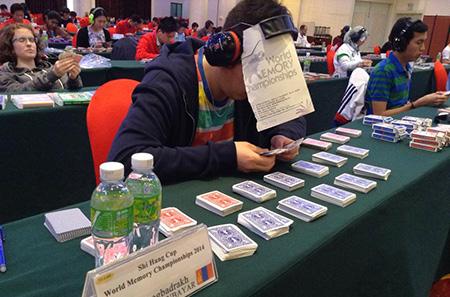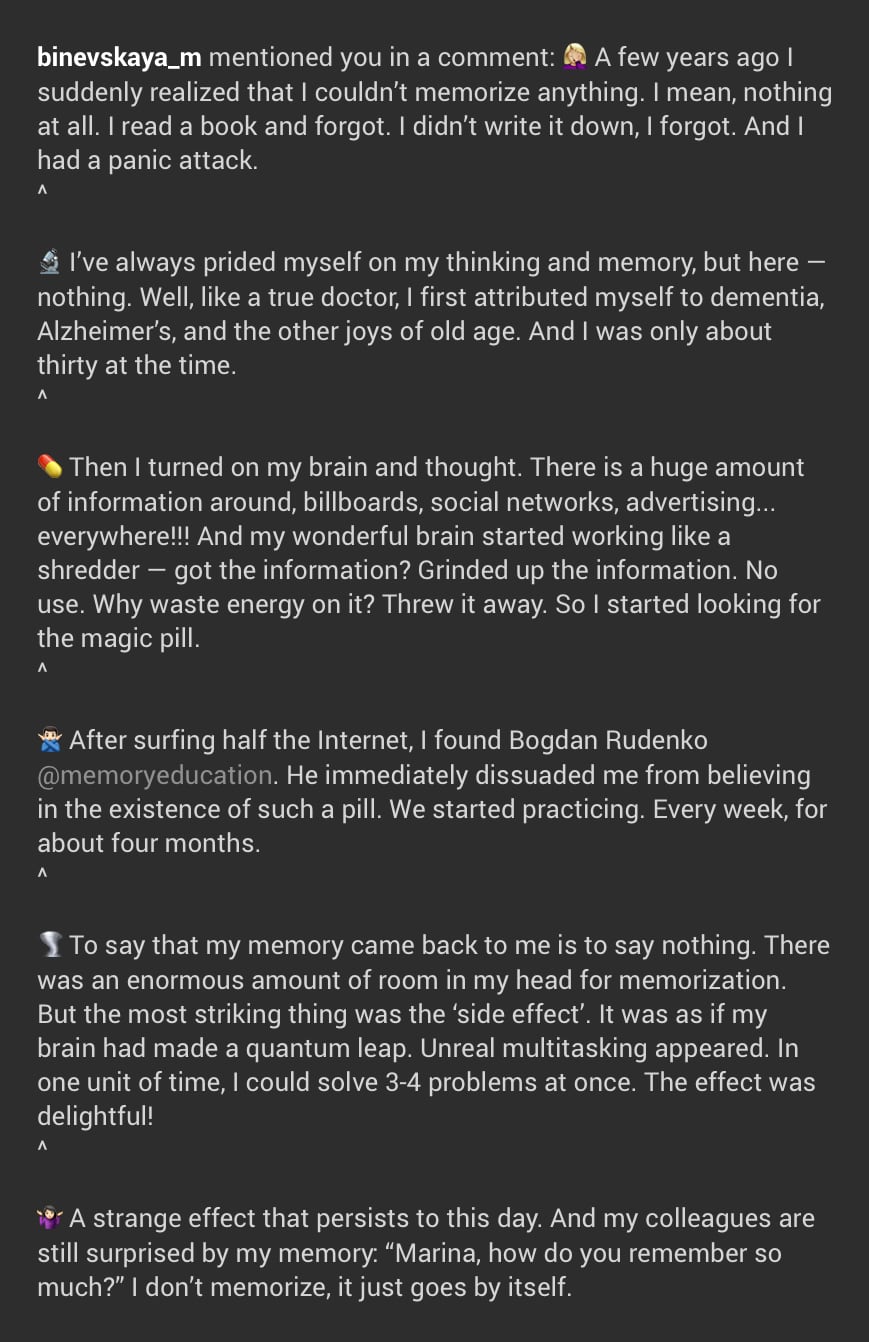Memory training: how to memorize information
I will teach you how to memorize any information. It will help you study better, cope with your work, and stand out from those who use Google instead of memory
What is this?
This is intensive online training on mnemonics—methods and techniques of memorizing information.
A mnemonic device, or memory device, is any learning technique that aids information retention or retrieval (remembering) in the human memory for better understanding
Why do you need memory training and courses?
Before the training, I get to know the participants and ask them what problems they have come up with.
They usually complain that they can’t remember text, numbers, foreign words, forget names and faces, can’t cope with their studies and tasks at work, and make their daily lives difficult.
Memory training and courses solve these problems.
Who are the memory training and courses for?
For students, teachers, experts, executives, officials, scientists, and anyone else who needs to keep a lot of exact information in their head.
The Magical Number Seven, Plus or Minus Two. It is often interpreted to argue that the number of objects an average human can hold in short-term memory is 7 ± 2. This has occasionally been referred to as Miller’s law
Training is unlikely to be of tangible benefit if you expect to listen to a popular science lecture about memory. Such motivation alone is not enough to handle the training load.
Memory trainer

What do you get at memory training?
You will master 10 thinking tools.
10 tools for thinking, 13 memory techniques, 25 types of information
- A tool for moving through memory as if it were computer files. You will read information from your head in forward and backward order, selectively, by keyword or question, in alphabetical order, or by a sequential number.
In the past, I was the head of the legal department. I used to come to important negotiations empty-handed, without a notebook and a pen. The other side perceived me as a layman who was invited for the show: “Difficult negotiations, and he only listens”. And this relaxed them.
But at the end I took the floor: “In paragraph 12 you said this and that. And in paragraph 47, you said this and that. This contradicts paragraph 32, where you said this and that. Besides, it’s not clear how it agrees with this and that in paragraph 28”. And so methodically I went on and on about each statement. You should have seen their faces. I wouldn’t do that now, it’s a shame to make fun of people. But when I was young, I used to make fun of people a lot.
- A tool for memorizing sequential information. You can memorize words of your native or foreign language, abstract concepts, names, letter combinations, numbers, and illustrations. Sequences can be of any length, and the information in them can be unrelated in meaning.
For example, you need to defend your term paper, diploma, dissertation, speak at a meeting or conference. You can use a piece of paper like everyone else. But it doesn’t look good, because “any fool can do it with a piece of paper”. You can cram the text of a speech for days. But there is no guarantee that in a stressful situation nothing will fly out.
And with the help of mnemonics, you can memorize the sequence of all theses down to the numbers and abbreviations that are difficult to pronounce. And you will remember it in any situation and any state.
- A tool for memorizing information about people. Surnames, names and patronymics, birthdays, addresses, phone numbers, nicknames, car license plates, and anything else you want to remember about a person.
My client was appointed to manage a large holding company. There was a problematic situation there, and the previous director was fired with a conflict. The employees remained the same: they loved the previous director and were hostile to the new one without even knowing him.
Alexander the Great remembered the 30,000 soldiers of his army by sight and name. He was brought up from the age of 13 by the ancient Greek philosopher Aristotle, author of the treatise “On Memory and Reminiscence”. And mnemonics for the ancient Greeks is like arithmetic and the rules of writing for us. Cyrus, Caesar, Napoleon—many used mnemonics
On my advice Robert went to the HR department and did a simple thing for a mnemonist: he talked to the HR manager and leafed through the personnel files. And then in the elevator, he shook hands with the man and asked him how his son Max was doing at school. And how his mother-in-law Rebecca was feeling after the operation. Any person is pleased to be cared for by a manager. And, of course, the employees immediately respected him.
If there is time left at the training, I can tell you more about how I helped a young law school teacher gain credibility with students. It was fun.
- A tool for memorizing informational messages. Store anything in your head: exact dates, events, dictionary entries, factual information, terms and definitions, place names, and objects.
My example again. When I was a young lawyer, I used to run around a lot in court. Representatives of the other side first write their claim or objection and then read it out at the session. In courts, I operated with sums, dates, contract terms, and article numbers without any papers. This greatly increased my credibility and helped me stand out from the rest.
- A tool for memorizing structural information. These are diagrams, tables, classifications from any field of knowledge.
Ordinary tables are boring to memorize. And in training, we try to take tables not just with numbers, but with illustrations, definitions, surnames, and other beauty. For example, the Architectural Style Guide. You memorize it, and then I ask, “Who is Pythias?” You answer, “The author of the mausoleum at Halicarnassus, one of the chief architects of ancient Greece along with Ictinus, Callicrates, and Mnesicles.”
I’m like, “Ancient Greek architecture... When was that?” You: “7th century BC to 1st century AD.” Me: “And what was there?” You: “They invented an order.” I show you a picture: “What kind of order is this?” You: “Corinthian.” Me: “What’s a stereobate?”. You: “The plinth of a temple or colonnade. In ancient Greece, it usually consisted of three steps.” This is the level at which we memorize structural information.
- A tool for memorizing foreign vocabulary. These are words, hieroglyphs, signs.
Mnemonics will not get rid of the need to learn languages. You’ll still go to courses, tutors, or study on your own. But you will dramatically increase the speed and quality of learning. If a school takes 10 years to learn 3,500 words, you can learn that number in 3.5 months.
And most importantly: if you’ve already taken the time to learn it, you’ve really learned it. And not the usual way: when you spend a lot of time and effort to learn it, it already seems like you know it. But then, for some reason, the right word slips out.
- A tool for systematic memorization. They tell you the number of a paragraph or a page, you respond with information. They tell you the information, you tell them the number where it is.
This skill is often abused by high school and college students. Children are mean, they like to make fun of the teacher. In training, I always admonish: “Be human, so you can be treated normally.”
I had a pedagogical internship in graduate school and we taught students for several years. As a teacher, I would have been troubled by a phenomenal memory. If I had been an ordinary teacher who hadn’t heard of mnemonics, I would have thought the student had a microheadphone or some other setup. And even if he proved to me that he remembered, it wouldn’t change my bad attitude toward him. Not because I was an asshole, but because I didn’t need to be humiliated in front of the whole class.
Mnemonics should be used carefully. Always consider the context. It’s like the superpowers of the DC Comics universe. Superman didn’t walk around in a costume all the time. He wore it for a cause.
- A tool for managing the retention period of information. You will decide for yourself how long to remember, from short-term to lifelong storage in your memory.
For example, you are dictated a phone number. Or a car flees the scene of an accident, and you need to remember its license plate number. We don’t carry a pen and paper anymore. And it takes longer to reach into your pocket for the phone than to memorize it: three flashes in your mind and the number is already in your head.
But you don’t have to remember this information for a long time. It’s enough to hold on to it for an hour to get to a quiet place and write it down there.
And there is information that you have to remember for the rest of your life. Doctors often come to us for training. They always have to remember that a stomach ulcer can only be stitched with absorbable thread, even if the ulcer is bleeding: non-absorbable thread is more reliable, but it won’t let the ulcer heal afterward. The wound in the small intestine must be stitched perpendicularly, otherwise, the lumen will narrow. If a hernia has impinged, the tactics depend on the time of impingement: if more than 3‑4 hours have passed, you need to operate, otherwise, there will be necrosis because of the lack of blood supply; if less—you can put it into the abdominal cavity. That in case of liver hemorrhage the hepatoduodenal ligament can be temporarily compressed. That in severe pancreatic injuries cholecystostomy is performed in addition to the basic procedures for additional bile outflow. And so on.
These are not my medical fantasies. I am quoting the practicing surgeon Norik Kazaryan. He had to take an exam in the US and wanted to get the highest score possible to compete. The exam lasts 9 hours, several hundred questions and they give 1.5 minutes for each one. This is hard to deal with without mnemonics. But only if we’re talking about real memorization skills: performances by pseudomnemonists on TV don’t count.
See Norik Kazaryan’s testimonial
- A tool for developing attention. You will improve all of its properties: concentration, volume, span, switchability, and distribution.
For example, you came in tired after work. Children are running around, the TV is loud, you want to eat, sleep, and want no one to touch you. But you sit down for a book or a foreign language lesson.
If you have developed attention, you can memorize for two hours without being distracted by extraneous thoughts or external stimuli. You don’t feel sleepy, and you don’t have to reread the same thing several times.
Genius is the supreme ability to concentrate on the subject being studied
- A tool for developing visualization. If you read the biographies of geniuses, all were distinguished by their developed visual thinking.
Nikola Tesla:
“My method is different. I do not rush into actual work. When I get an idea I start at once building it up in my imagination. I change the construction, make improvements and operate the device in my mind. It is absolutely immaterial to me whether I run my turbine in thought or test it in my shop. I even note if it is out of balance. There is no difference whatever, the results are the same. In this way I am able to rapidly develop and perfect a conception without touching anything. When I have gone so far as to embody in the invention every possible improvement I can think of and see no fault anywhere, I put into concrete form this final product of my brain. Invariably my device works as I conceived that it should, and the experiment comes out exactly as I planned it. In twenty years there has not been a single exception.”
I am not saying that if you develop visual thinking, you will necessarily become a genius. But without developed visual thinking you definitely will not become a genius.
Memory training program
The first day (Saturday)—mastering memorization techniques
10:00-11:30
Visual images
- how to work with imagination to make the brain memorize information: the mnemonic square, formulas for connecting images, thinking operations, relative sizes, rules for forming connections.
The words or the language, as they are written or spoken, do not seem to play any role in my mechanism of thought. The psychical entities which seem to serve as elements in thought are certain signs and more or less clear images which can be ‘voluntarily’ reproduced and combined. <...> This combinatory play seems to be the essential feature in productive thought
12:00-13:30
Sequences
- how to memorize information in lists and sequences: basic techniques;
- how to memorize numbers: why you can’t memorize exact information without special training;
- practice: memorize to-do lists, lists of meetings, sequences of talking points;
- practice: memorize numbers.
14:30-16:00
Coding
- how to convert unremembered information into the memorized form: ways to encode it into images;
- practice: memorize abstract words, names, abbreviations, letter combinations, syllables, foreign words;
- practice: memorize twenty difficult to pronounce words—lavmajkal, babsafwal, tasmavhac, pedwacrak, fasvilcem <...>, reproduce them in forward and backward order (this will help to memorize real foreign words on the second day of training).
There are, then, two kinds of memory: one natural, and the other the product of art. The natural memory is that memory which is imbedded in our minds, born simultaneously with thought. The artificial memory is that memory which is strengthened by a kind of training and system of discipline. But just as in everything else the merit of natural excellence often rivals acquired learning, and art, in its turn, reinforces and develops the natural advantages, so does it happen in this instance
written in 86-82 BCE
16:30-18:00
Phenomenal memory
- practice: in 5 minutes we memorize 20 words under ordinal numbers (I say a number, you answer with a word, or I say a word and you give me the number under which you memorized the word; this is something you may see on TV shows like The Brain, Superhuman and others);
- practice: mental exercise—in 10 minutes memorize a 200-digit number (this keeps the memory skill in working order and helps combat age-related memory impairment).

The second day (Sunday)—practicing memorization technique on real information
10:00-11:30
By the information in your head, as by the files in your computer + dictionary articles
- how to upload information into our head for a self-determined period;
- how to freely read information from memory without stuttering;
- practice: memorize dictionary articles in information block—paragraphs, sections, chapters;
- practice: memorize factual information with a lot of exact information.
12:00-13:30
Diagrams and illustrations + encyclopedic information
- practice: memorize diagrams and illustrations;
- practice: memorize encyclopedia articles.
14:30-16:00
Tables + interpretations of terms
- practice: memorize tabular information—from two-column to multi-column tables;
- practice: memorize terms and their definitions.
16:30-18:00
Foreign words + information about the person
- practice: memorize foreign words (universal technology helps you memorize words of Western and Eastern languages);
- practice: memorize information about a person—names, faces, addresses, phone numbers, car license plates, birthdays, biographical details.
How does memory training work?
Real-time mode
This is not a recording of the training. This is not a mailing list of assignments or materials. It’s not access to lessons on a restricted section of the site. Not an online broadcast of a live event where I teach in the room and you passively watch through a webcam.
You are a direct participant, and I will train your memory as if we were in the same room.
Conveniently
You’re in your home, but you’re training face-to-face with me and the other participants. You see the desktop of my laptop instead of looking at the screen from the hall. We work together on presentations, documents, and applications, and synchronously view training sites, videos, and images.
Feedback
I give feedback in real-time. I can tell by the expression in your eyes what mistakes are and correct them right away.
People come to me not for theory, but for direct feedback, to finally be able to memorize.
Uniqueness
I could record the training on video, and sell it on record.
But all training is different. I create an atmosphere for a specific group and teach memorization techniques, adjusting each time to the composition of the participants. That’s why one record for everyone is useless.
There is no personal contact with me on the record. You can’t ask a question. You don’t feel like an equal participant.
I want training to be beneficial, so every training is an interactive conversation here and now.
12 participants
At the training, I try to pay attention to everyone. Everyone should have the opportunity to ask a question, get an answer, and share their experiences. Only 4 participants fit on the screen—to see the next four, I scroll through the tape. Therefore, I take up to 12 people to the training. Only then am I confident that I will help get results.
At a regular offline training session, you can sit in the back and be lazy. With me, you can’t cheat—I see everyone
Questions about memory improvement
People often ask us these questions before they buy a training ticket.
Why don’t you have free lessons, webinars, and marathons? You offer to buy the full training right away. But this is not right.
As an experienced internet marketer, I advise to make a sales funnel: 1) the person sees your ad and goes to the registration page for a free webinar, 2) he leaves his mail and then you warm him up with letters so he doesn’t forget, 3) on the webinar you sell him a full course, 4) after the webinar your sales team calls him, and 5) at the end you finish him in letters and messengers.
Why would we want to do that? We sell an understandable service. It’s no different from other services in established markets: driving courses, accounting, or foreign languages.
When we want to learn how to drive, we enroll in a driving school and don’t ask them for free webinars. You already know what they will teach. The main thing for us is how many years they have been on the market, what reputation they have, and that they support us at the exam at the traffic police.
When we go to foreign language courses, we understand that there. And selling funnels will only get in the way. Another thing if it’s quackery: supposedly unique language learning methods developed by special services, or some other nonsense. Such courses cannot be sold without webinars and aggressive advertising.
With us it’s simple. You see the program and understand what you get for your money. I’ve been doing this training online since 2015. Before that, I spent 5 years traveling around the cities and teaching in live halls. There’s a huge amount of feedback on YouTube about us. I mean, we’ve been in the market for a long time.
We’ve been building our reputation for a long time. And we’re worried that free webinars will put us in line with internet marketers. These guys love autofunnels and know exactly how to push emotion to buy their product.
But they don’t sell what they themselves can do, but what they’ve been taught in other courses. We don’t want to be mixed up with them: a person comes in, sees “sign up now and get a tutorial,” thinks it’s another scam, and closes the page. Our whole reputation is down the drain.
Language schools have trial lessons. They are free, but it doesn’t smell like a scam: You need to see who is going to teach.
In social networks we post fragments of training sessions: you can look at the manner of teaching. If it doesn’t suit you, feel free to go to my colleagues. Choose a trainer with whom you feel comfortable. I am interested in this myself: I need you to work without being distracted by the timbre of my voice, the color of my shirt, or the fact that I am sipping my tea.
To summarize.
You can go on free webinars and courses endlessly. You can watch videos and read PDF-instructions “How to improve your memory in 5 minutes a day.” After that, it seems that you know everything and understand memory better than a neuroscientist. But you still can’t remember a textbook or numbers before a meeting.
Don’t waste your time on this. Money can be earned. Health can be improved. But an hour of life on a free webinar can not get back. As for me, it’s better to pay and in 2 days to leave with a ready memory skill.
I don’t mind free memory courses. It’s great if you enjoy the process itself. You come in after work, and there’s a webinar: you relax, switch your attention, chat. In the beginning, you listened to everything interesting, and when the sale started—you left.
If it’s a form of leisure, that’s fine. But it certainly should not be seen as full-fledged learning.
Is it possible to learn memorization techniques in two days?
It is possible. You have studied at the weekend and already on Monday at school or work you memorize the necessary information.
Another thing is that any skill can be polished endlessly. You came to the driving school, learned the theory, mastered driving, passed the exam, and got your license. But you are obliged to drive with the sign “70” for another 2 years (in my country, Ukraine, it is so). Why, if you already know how to drive? Because your driving experience is short. It’s physiology: until you’ve driven the required number of hours, you’re still an inexperienced driver. And no instructor can drive for you.
My job is to teach you how to memorize. And you will hone your skills without me in the course of your life. It is not necessary to find special time and do special exercises: each time you memorize educational or work information, your memorization rate and the amount of information loaded into your head will increase.
There are memory improvement courses in our city. They have 10 lessons and you have to go for a month. You have only two days. Is your training an abridged version?
Two days is 16 hours. 16 hours is 16 classes in your memory courses. If you have two lessons a week, that’s two months. By that logic, my training is more extensive.
A two-month course may sell more expensive because its value seems higher. But the memorization skill is better embedded in a two-day intensive. That’s why we don’t spread the training program over time.
Why don’t you promise that I will become a genius? I’ve seen courses on the development of intellectual abilities that are called “Become a Genius.”
I am a mnemonic teacher, not a teacher of geniuses.
A teacher at the school teaches writing but does not promise that the child will become Stephen King and make a $400 million fortune.
It’s the same with me—I teach you to memorize, but I don’t know if you will become a genius. I know one thing for sure: you can give birth to something new out of your head if you have something in your head. And to have something in your head, you have to memorize this “something” beforehand.
Other sites promise that by taking their courses the student will be able to receive an increased stipend, will spend a week a semester studying, and will graduate from college in one year. An employee will gain professional confidence and become someone with whom it is impossible to compete, while easily getting a raise and a raise in salary, or easily finding a high-paying job. And the businessman will become a business professional, ready to make the right decisions quickly, he will immediately begin to earn many times more, because the development of new neural connections in the brain will make his vision much broader.
These promises are backed up by concrete figures: “You will be able to graduate not in 5 years, but 1‑2 years. Become an experienced professional not in 15 years, but 3 years. You will be able to save for an apartment in 2 years, not 10 years.”
What are the practical benefits of your training? Will I be able to become financially independent?
These promises are aimed at simple-minded people. They are not related to the service offered and put pressure on basic human needs: “Take a memory course and save for an apartment not in 10 years, but 2 years”! They are not backed up by anything: “You’ll start earning times more right away! How does it work? Thanks to the latest advances in neurobiology!” They are superficial: I don’t know how business works, but just in case I say “make the right decisions quickly.” I don’t understand how the educational process works, but just in case, I’ll write “you’ll graduate as an extern.”
I understand that if they write that, it works. But I prefer to treat my clients with care and respect, regardless of whether they are smart or stupid, rich or poor.
I offer my clients a partnership: I honestly solve their memory problems, they honestly pay me for it. I like to communicate as equals. I don’t consider myself smarter than my clients. They will make the right decision on their own and I respect their right not to come to me for training.
This approach is justified for me not only morally, but also practically. If a person buys into the promise of a pay raise after a memory training, suddenly he will really come. And then what will I do with him?
You boast that your services are for intelligent people who are guided by reason. Don’t you think the phrase “phenomenal memory” is meant for those who make decisions based on emotion?
I agree, “phenomenal memory” sounds like “exclusive premium services of unparalleled quality from a team of highly qualified educators from one of the leading companies in the educational services market”.
But I don’t know what other phrase to use to describe how people remember after our memory training.
Do you use secret service techniques to develop memory?
No, because there are no techniques. This is a publicity ploy, exploiting the traditional interest in the work of the intelligence services.
The scouts in feature films are fictional characters from World War II, “solving special problems behind enemy lines.” To do this they had to memorize ciphers and locations of enemy units.
Today’s Bonds and Bournes don’t need memory in the movies or life. No one memorizes legends and passwords anymore.
I have an acquaintance—a major general, former head of the Main Directorate of Intelligence of the Security Service of Ukraine. He comes from a generation of Soviet spies. They were romanticized, books were written and movies were made about them. The image of a hero with a phenomenal memory was highly popularized back then.
When we opened the Memory Development Center in 2012, I asked them to organize a master class at their academy for PR purposes. But the general said that modern intelligence officers don’t need it. Languages, psychology, the ability to make contacts and gain the trust of strangers, yes. But no one needs memorization skills nowadays. These are all myths from books and movies.
If future spies are suddenly introduced to the elements of mnemonics, it’s a small part of what I give in memory training. So it’s not us, it’s them who use our memory techniques.
Will I be able to participate in world memory championships and memorize decks of playing cards at speed after the memory training?
Easy. Sports mnemonic technique is primitive: learn the image codes of playing cards and scatter them into supporting images. Three months before the competition, six hours a day, train yourself in this, and if there is not someone more stubborn, victory is assured.
Sports mnemonists memorize nonsense like cards, binary numbers, and blots. Look at the contestants on YouTube: they are either children who are obliged to please their parents, self-affirming teenagers, or overgrown freaks.

They do not know how to memorize complex information that we encounter in real study or work. At the same time, at competitions, they memorize for a short time in order to answer and then immediately forget. But in life, you have to be able to remember for a long time. I prepare my clients for life, so I think it makes no sense to waste time on competitive mnemonic techniques.
The same can be said about talent shows. All these Superhuman, The Brain and other TV productions are far from reality.
Is your training prevention of age-related memory impairment? Other courses call themselves “gyms for the brain” and promise to “turn on specific processes in the brain that guarantee 100% insurance against Alzheimer’s and Parkinson’s disease.”
Alzheimer’s and Parkinson’s diseases are fatal neurodegenerative diseases. They have an unclear etiology and pathogenesis and are currently incurable. It is unethical to manipulate the fear of death and guarantee 100% insurance against incurable diseases.

By engaging in mnemonics, you keep your mind active. Common sense dictates that active thought activity should slow the death of brain cells.
But it is unlikely that Ronald Reagan (US president) or Margaret Thatcher (British prime minister) did not use their heads enough.
Reagan was an actor when he was young, and actors train their memory all the time. Rita Hayworth, Charlton Heston, Peter Falk, Ani Girardot were actors, too, and they died of Alzheimer’s. Ask this “brain gym” if Iris Murdoch, the Booker Prize-winning English novelist, and philosopher, didn’t think enough.
Or did writers Arthur Haley and Terry Pratchett need to “turn on specific brain processes” so they wouldn’t die?
Memory training is recommended to friends

Memory training participants say

Economy
Day 1:
- visual images
- sequences
- information encoding
- records on TV
Day 2:
- memory readout
- dictionary entries
- encyclopedia facts
- diagrams and illustrations
- tables
- terms and definitions
- information about people
- foreign words
Mastergroup:
- unlimited support in a closed community (pay once and then work with a trainer for life)
in your local currency at the exchange rate of your bank
Standard
Day 1:
- visual images
- sequences
- information encoding
- records on TV
Day 2:
- memory readout
- dictionary entries
- encyclopedia facts
- diagrams and illustrations
- tables
- terms and definitions
- information about people
- foreign words
Mastergroup:
- unlimited support in a closed community (pay once and then work with a trainer for life)
in your local currency at the exchange rate of your bank
“Click the button at the top and sign up. See you at the training”
